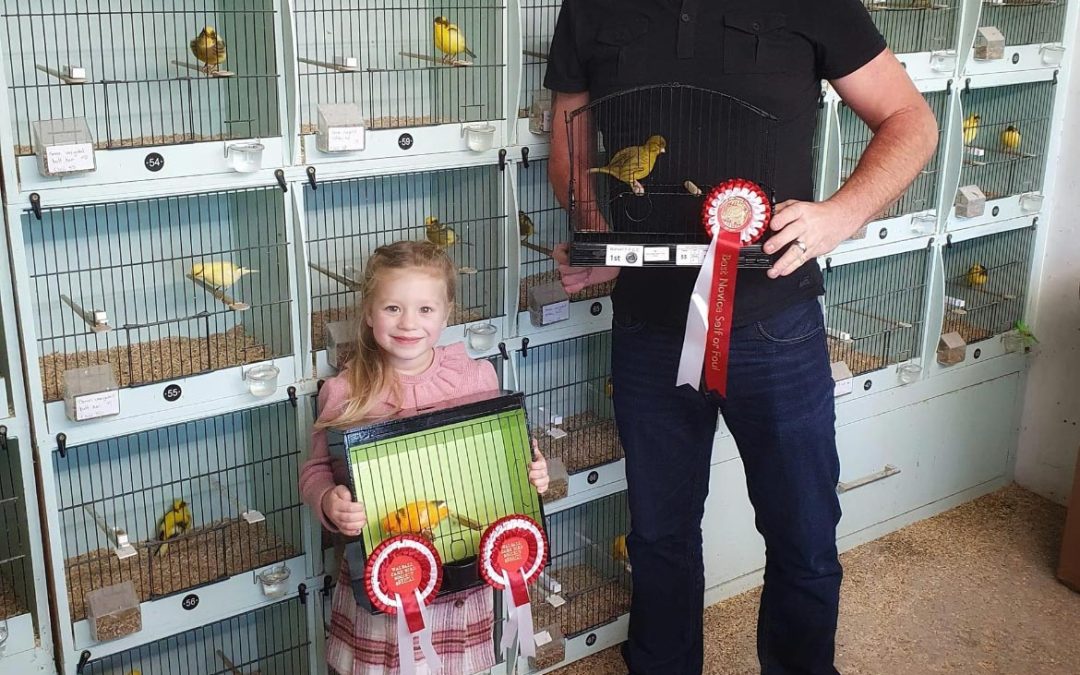David Cheshire is a name that most now will be familiar with given his impressive exploits in this years fancier of the year competition along with the regeneration of the international ffca.
Here I discuss with Dave his experience with fifes and his methods.
Q.How long have you been involved with the fife fancy and birds in general.
DC. I first kept fifes around 15 years ago and had them for 3 years- life throws curveballs and I had to let them go at that point however I’ve been lucky enough to be in a situation where I’m settled and approaching my 3rd season with the birds. My daughter also keeps some Norwich and Irish and we share an outdoor area containing small parakeets, fantails and a pair of peacock pheasants. Livestock in general will always be part of my life and have a affinity with koi carp also
Q Can you describe your current birdroom
DC. My current room is 6m x 5m with a concrete floor this allow any spillage to dissipate rather than rot a floor. It contains 105 cages which can be opened into long flights. I also have 2 good sized flight cages for overwintering adult hens and my daughter has 15 cages where she keeps her own birds as previously mentioned. The room contains plenty of storage, staging for training and importantly a sink. I also have an extractor fan which was advised to me as a must by Phil Warne to keep fresh air flowing throughout.
Q which feeds do you currently use
DC. I use countrywide mixed seed with added Vam however I am exploring the unifeed option- when you look around the pet trade in general most if not all animals are now fed a complete food. This means more balanced as it’s scientifically researched, no waste and less work topping up hoppers every second day.
My eggfood is made up with a base of eggfood to which I have no preference but mostly use kings, cede or easyem to this I add cous cous, boiled eggs and I vary the fruit and veg content to moisten as I believe hens are kept interested by varying this ingredient. The only supplement I use is boost 250 as this is the only one I have noticed a distinct difference within the birds.
Q How are you creating your own stud at the moment
DC. Last year I used 24 hens and managed to breed 207 chicks. I aim to maximise output from my best cocks birds- this year 1 cock was used over 11 different hens with great success. I believe you need the numbers as one or two failed hens could pull your family too close in a small stud. My better birds are now being produced from a blend of Rodger&Wood and Henry cooper bloodlines and both studs have continued to support me whenever required. I have bought from other exhibitors and leading studs but had bad experiences with birds fitting and dwindling away. I would advise find breeders you can trust and stick with them as trust is paramount.
Q is there anyone in the hobby you admire or something you would like to see more of
DC. I respect any breeder that puts the effort into the hobby but particularly like paying attention to the Scottish breeders. They don’t exhibit big numbers some only 6/12 birds but their birds are always well placed for example George Jackson & Sammy McColl.
I would like to see a point when the fed decides it wants to talk to the council and the quality of studs from both organisations can once again compete against each other.
Q. What medication do you keep to hand
DC. I keep zooerine tablets as my go to medication then follow up with 5 days on baytril this is all that’s usually required.
Q. What is your biggest achievement to date in the fancy
DC. I’ve yet to have that first big win but have been very happy picking up numerous specials and 2 best novices awards this year at council events and 1 best novice at a federation show.
My biggest achievement has to be winning the fancier of the year award for the novice section this year which I’m very proud off considering the level of competition from guys like Matt Dando, Ryan Adams, Donnie dundas and Malcolm Pape to name but a few.
Q. What advice do you give to someone starting out.
DC. Find a successful breeder and exhibitor with a style of bird that you like but only after visiting a few studs with no commitment to buy. You require a friend and mentor not a dealer who sells then forgets about you as you want to return if you are successful. Visit some shows to compare what’s winning consistently as this may change the style of bird you prefer. This is knowledge you will need when you come to the bench. Everyone has the best birds when they are in their own shed and will have a great sales pitch. It’s the bench that counts. Colour is unimportant but I do lean towards lighter birds in my own stud.
Q. Finally your thoughts for next year
DC. To continue where I left off. Improve the stud during the breeding season and hopefully succeed in being highly competitive again next year. Maintain high standards and let the birds do the talking. In my role at the International ffca I hope with the council show being placed their next season that it grows yet again. It’s a privilege to be a part of a shows success and if we can progress it yearly we are going in feb right direction.

